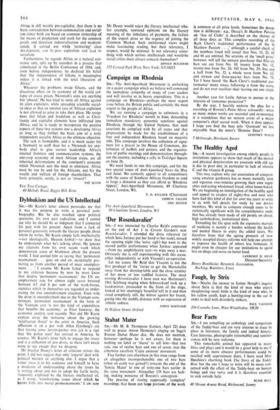Dybbukism and the US Intellectual
SIR,—Mr Kazin's letter almost persuades me that it was his purpose to write a personal auto- biography. But he also touched upon political questions, his own past radicalism, and I cannot see why he should be so indignant that I connected his past with his present. Apart from a lack of personal generosity towards the literary people about whom he writes, Mr Kazin simply fails intellectually —not ideologically, Heaven forbid!—to show that he understands what he's talking about. He ignores my citations from his own recent work which demonstrate areas of blankness about the present world. I had quoted him as saying that 'permanent rearmament . . . goes on and on, incidentally pro- tecting us from another period of mass unemploy- ment. . . I assume Mr Kazin failed to respond to my criticism because by now he must know that despite 'permanent rearmament,' the US un- employment rate for almost eight years hovered between 4.5 and 6 per cent of the work-forces, statistics which in themselves are regarded as under- stating the true unemployment situation. Even with the drop in unemployment due to the Vietnam com- mitment, 'permanent rearmament' in the form of the Vietnam cost 'is not the kind of expenditure that benefits the economy,' as Eliot Janeway, the economic analyst, said recently. Nor did Mr Kazin explain away the nonsense about the growing 'totalitarian threat' to the artist in America. Such effluvium is on a par with Allen Ginsberg's cry that tossing sonic heroin-pusher into jail is a sign that 'the police state' has arrived in America. In essence, Mr Kazin's letter fails to engage the issues and is a collection of ipse dixits, so there isn't much more to say except that we disagree.
Mr Jocelyn Davey's letter of criticism misses the point. I did not suggest that only 'experts' deal with political matters or anything else. I argue that a writer owes it to his audience and himself to have a modicum of understanding about the issues he is writing about and not to adopt the facile tactic, frequently exploited by the literary intellectual of, as I wrote. 'transforming issues about which he knows little into moral pronouncements.' I am sure
Mr Davey would reject the literary intellectual who, for example, ventured opinions on the literary meaning of the imbalance of payments, the failure of the export drive or the urgency of joining the Common Market. Such uninformed views might make fascinating reading, but their relevancy, I suspect, would be minimal. Is not relevancy some- thing with which serious intellectuals and would-be social critics must always concern themselves?


































 Previous page
Previous page